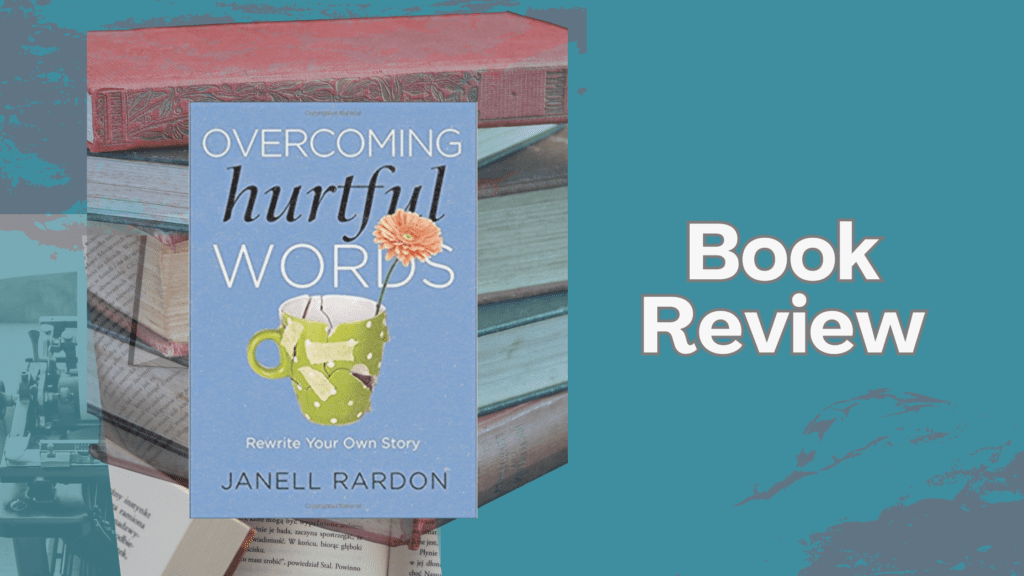Overcoming Hurtful Words: Rewrite Your Own Story
You have power—an incredible amount of power—to rewrite your story, and “you don’t have to do it alone”, says Janell Rardon, author of Overcoming Hurtful Words: Rewrite Your Own Story. Our life’s story begins the day we are born into this broken world. Perhaps our parents tried to shield us from its darkness, or maybe they didn’t. How can we be totally unaffected by the negativity all around us, that is spread like pollen in the air? We are all impacted by negative words which, unfortunately, have shaped our lives to some extent. Many of us know words can hurt, wound, heal, and inspire. But how do we overcome the words that hurt, so that we live differently and change our unhealthy behavior patterns and communication skills? That’s where Rardon’s book Overcoming Hurtful Words: Rewrite Your Own Story comes in.
Throughout Rardon’s book, I felt like I was having a one-on-one coaching session face-to-face. Janell is a professional life coach and writer. Though she tells us she loves words, it is obvious in the way she crafts and plays with words and sounds. She creates new words—tongue twisters—like “heartrift,” “heart sift,” and “heart lift,” which represent the three sections of her book: Reflect, Reframe, and Re-Author.
- Reflect: Heartrift – What just happened? Welcoming God into the “whys” of the present pain.
- Reframe: Heartsift – Where did it come from? Facing the fault lines of past hurts.
- Re-Author: Heartlift – Will I trust again? Living in the new-found freedom of Christ.
Overcoming Hurtful Words is a guide, manual, workbook, and a tool kit all in one. Rardon takes us on a journey, which she calls a heartlift, and she becomes our guide. Each section contains three practices, including an intention to focus on. As the guide, she carefully prepares us for  this trip by equipping us with the language that will be used; not just any words, but the words that will shift us, inspire us, and uplift us. Her opening, functioning like a manual, tells us that this book is her “humble and passionate plea to help change the narrative of negative behavior.” She reminds us that “life is too short to waste entangled in crushing others with our words. And when we do get entangled, because we are imperfect human beings…it is critical to untie the knots with wisdom, grace, and a deep, healthy respect for one another” (p.2).
this trip by equipping us with the language that will be used; not just any words, but the words that will shift us, inspire us, and uplift us. Her opening, functioning like a manual, tells us that this book is her “humble and passionate plea to help change the narrative of negative behavior.” She reminds us that “life is too short to waste entangled in crushing others with our words. And when we do get entangled, because we are imperfect human beings…it is critical to untie the knots with wisdom, grace, and a deep, healthy respect for one another” (p.2).
Overcoming Hurtful Words is also very much a workbook with opportunities to reflect, reframe and re-author areas of our lives. Throughout the book, Rardon gives us practical tools to rewrite our story. One of the tools that she gives us is the acronym W.H.O.L.E:
W: Welcome God in and whisper
H: Hold Fast to your truth (value, worth and dignity)
O-Overcome unhealthy with healthy
L: Lean in and listen between the lines
E: Elevate the atmosphere
Rardon draws from an array of fields—psychology, neuroscience, literature—but the Christian Scriptures are the core of her work.
Rardon weaves the Scriptures into various fields of learning, giving us a fresh look on life and our own personal journey. She daringly goes into the spaces—the “Whys”—and encourages us to invite God into them.
Overcoming Hurtful Words should be read by everyone. But Rardon writes the book for her female audience. Rardon also seems to limit “hurtful words” to relationships we have with one another, that is, what we say to or about each other. But, what about those hurtful words we speak to ourselves? What about our thought language? Though Rardon indirectly ventures in this area, I would have liked her to address directly our thought language as well. Perhaps it is enough to deal with words in the context of our relationships with others. After all, if we could improve what we say to each other, we would have better friendships, marriages, and, certainly, a better world.
Overcoming Hurtful Words: Rewrite Your Own Story is available in print and e-book. If you are not a reader or you simply don’t have time to read, then you will also find her book on audio. Remember, faith comes by hearing and hearing the Word of God. There is something special about hearing words that can uplift the heart. Rardon calls this the heartlift!



